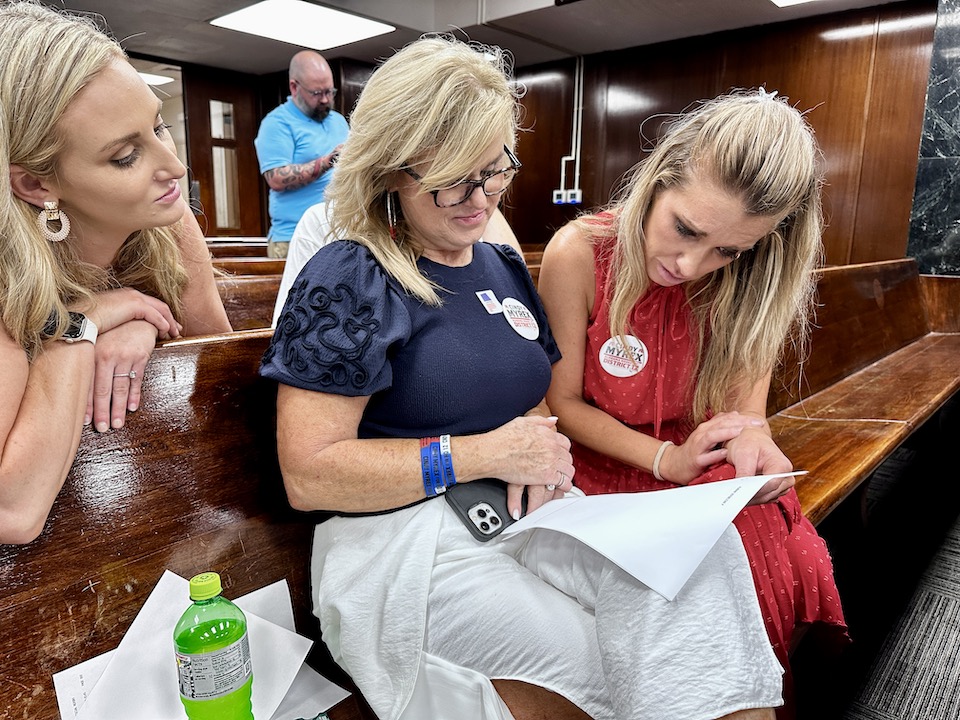PROFILE | Travis Kress: Home to Work
Published 8:19 am Tuesday, April 4, 2017

- Travis Kress is the project coordinator for the Cullman County Soil and Water Conservation District, a job he’s held as a part-time and then a full-time position.
You could say that Travis Kress brings his work home with him. But you could also say that he brings home to work.
Kress, 28, is the project coordinator for the Cullman County Soil and Water Conservation District, a job he’s held as a part-time and then a full-time position.
Trending
He is also is a fifth-generation Cullman County farmer. His great-great grandfather started the family farm about 100 years ago after coming over from Germany and getting a land grant. “We’ve been farming it ever since,” Kress said of his family’s land.
His parents, Brian and Pam Kress, run the larger farm, growing hundreds of acres of mainly sweet potatoes as wholesale farmers. After graduating from Auburn with a degree in agronomy and soils, the younger Kress realized he would need to branch out on his own.
“There wasn’t a job to walk into right then, and the sweet potato farm was already supporting all it could support,” Kress said.
He and Ashley, his wife of almost five years, started their own truck produce farm, growing strawberries and peaches as their main crops, as well as summer vegetables like cucumbers, squash, tomatoes, okra, and zucchini. During the growing season, Kress Farms set up booths at Madison City Farmer’s Market and the Cullman Festhalle.
Kress said the truck farming industry can be quite competitive. “There’s 30 other individuals, elbow to elbow, with the same produce that you have, so it’s the most highly-competitive atmosphere, as far as selling goes, that you’ll ever encounter,” he said.
“One reason I like it is because it gives me a one-on-one chance with my consumer,” he said. “I get to tell them the care that went into it and the ways we enjoy preparing it. We get to form a relationship with them.”
Trending
Kress said small truck farming is a growing industry. “There’s more of a desire to know your farmer and know your food,” he said. “So, consumers form that relationship so that they’re more likely to come to me than to go to the grocery store.”
Still Kress said they’re lucky they don’t rely on their small farming business for all their income. Ashley is a kindergarten teacher at St. Paul’s and he has his work with the Soil and Water Conservation District.
As a project coordinator with the Soil and Water Conservation District, Kress helps with education programs, services for farmers, and applies for grants to assist farmers.
“I was interested in taking my degree and assisting farmers, along with farming, which gives me a special tie that most people don’t have,” Kress said. As a farmer, he said he’s able to see first-hand what farmers are facing.
“I see a lot of the problems they’re talking about on the ground and experience it first-hand, and then I get to use my position to help them,” he said.
One of the first grants he nurtured through on his own was to purchase equipment area farmers can rent to transition to a plasticulture system of farming, rather than a traditional mulching system. “We lay plastic mulch rows and we plant into it,” he said, “which lowers our need for water and gives us a much more efficient way to water, to put fertilizer out, and to manage weeds so we have less herbicide usage.”
The system provides yields three to five times higher than traditional methods, Kress said, but the equipment needed for it costs about $15,000 and is used about two days a year. Kress applied for a grant through the Alabama Ag and Industry Crop Block Grant, obtaining the money for the SWCD to purchase the equipment and a trailer to transport it. Area farmers can rent the equipment for $50 a day, rather than spending $15,000.
“There have been several farmers who’ve been able to transition to that system, and since they’ve seen the yield increase, some of them have went so far as to purchase the equipment themselves,” Kress said.
Since he’s more experienced a crop farmer, Kress said he makes the effort to listen to area farmers in the poultry and cattle industries so he can help them when needed. “I listen to a lot of them, so that’s where I gain my knowledge in that industry,” he said.
Kress also spreads knowledge with children and adults with his work through the Soil and Water Conservation District. He will help lead field days and gives tours at his own and other farms in the area.
“We have field days to demonstrate methods that come out that not only help soil and water quality, but provides economic benefits to the farmers,” he said. They’ll visit schools or give tours through different organizations and events like Farm Y’all to let the community get a feel for what farming is like and to see first-hand issues farmers are facing. “When you come out here and ask me questions, I’ll be blunt and straight up with you,” he said. “I will tell you the issues, what we’re facing and what the problems are and tell you why we believe that.”
Kress aid he loves interacting with the farmers and the public. He’s not as excited about the paperwork he must keep up with, but the end results are worth it, he said. His most favorite place to be is on a farm, whether someone else’s or his own.
“You know, we were forced to do it as a kid, and now we want to do it,” he said. “I hated having to drive that hot tractor all summer. But now, you spend a lot of time looking out the window just wanting to be out there, even if you’re sweating it out.”





